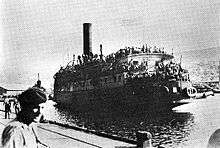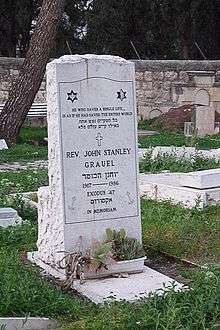John Stanley Grauel
John Stanley Grauel (December 12, 1917[1] – September 6, 1986,[2] also nicknamed "John the Priest" after Prester John[3]) was a Methodist minister and American Christian Zionist leader. He was a crew member of the famed refugee ship the SS Exodus-1947 and a secret "Haganah" operative. Grauel is credited with being the key individual who persuaded the United Nations Special Committee on Palestine to recommend for the Partition Resolution of November 1947, creating the State of Israel. In a speech to the Jewish Agency, Golda Meir, referred to his testimony as the first appeal by a “priest, a perfectly worthy gentile, a priori, no Jewish witness was to be believed.”[3]
John Stanley Grauel | |
|---|---|
 | |
| Born | December 12, 1917 |
| Died | September 6, 1986 (aged 68) |
| Nationality | American |
| Known for | crew of the SS Exodus and testimony to UNSCOP |
Early life and education
John Stanley Grauel was born in Worcester, Massachusetts, in 1917. His mother was deeply religious and impressed her son with her beliefs. The family became a migrant family during the Great Depression until settling in Virginia.[3] Grauel studied at the Randolph–Macon College as a pre theological student. His father died from cancer in 1936 and Grauel supported the family doing various jobs. In 1941, he completed his education, graduating from the Theological Seminary, in Bangor, Maine, as a Methodist minister. During his final year he got married, but his wife and son died due to complications at childbirth.[3]
In Haganah and Exodus

_before_its_departure_for_Europe.jpg)
Grauel became very aware of the European Holocaust and the Zionist movement in 1942 through his close friendship with Judge Joseph Goldberg of Worcester. Also in 1942, he joined the American Palestine Committee, which was dedicated to the establishment of a Jewish state. In 1943 he gave up the local ministry to assume a position as a director of the committee's Philadelphia office. In 1944, attending his first Zionist meeting he met David Ben-Gurion, the Zionist leader and future prime minister of Israel. Grauel learned of the Haganah, the Jewish underground army in Palestine, and the longtime humanitarian efforts of the Haganah to save Jewish lives from the Holocaust by smuggling Jews into Palestine. Reverend Grauel enlisted in the effort immediately, leading a double life working for the America Palestine Committee and the Jewish underground.
Grauel became part of the Mossad LeAliyah Bet and sailed aboard the famed illegal refugee running ship the Exodus on March 23, 1947. The Haganah placed him aboard as a secret operative, under the cover of a foreign correspondent for the Episcopal journal, The Churchman. Grauel's mission was to get the story of the Exodus '47 out to the world. In Europe he organized and transferred refugees from the DP Camps to the ship. Filling multiple roles, he acted as an administrative executive, quartermaster, cook, and a liaison for the crew and the refugees.[3][4] The Exodus, heavily overburdened with 4,554 refugees, was intercepted and captured by British destroyers off the coast of Haifa, Palestine, in a brief violent assault that left two refugees and one crew member dead. Grauel was arrested by the British. He was put under house arrest at the Savoy Hotel. Learning that the hotel lobby was filled with journalists from around the world, he got in to tell them about Exodus and answer all their questions. With help from the Haganah, he escaped before the police arrived.[3][5]
Testimony to the UNSCOP
Following his escape, the Haganah helped bring Grauel to meet Jorge García Granados, a member of the United Nations Special Committee on Palestine and give firsthand testimony, emphatically declaring that there were no weapons on board the Exodus during the violent assault.[3] He was brought later to give a direct testimony before the United Nations Special Committee on Palestine. His firsthand testimony was extremely effective in eliciting sympathy and understanding for the cause of unrestricted Jewish refugee immigration to Palestine.[6]
Golda Meir, a later Prime Minister of Israel, observed that Reverend Grauel's testimony and advocacy for the creation of the Jewish State fundamentally and positively changed the United Nations to support the creation of Israel. Grauel said that his testimony before the United Nations Special Committee on Palestine was given more credence because he was a Christian, rather than a Jewish crew member.[7]
Later humanitarian efforts
Throughout his life he maintained close associations with Jewish concerns. In the 1950s and 1960s he led investigations into the terrible conditions of Jews living in Morocco and Algeria. In 1975 he led one of the first Jewish youth tours of the Nazi concentration camps in Europe. Reverend Grauel was drawn to numerous humanitarian efforts including the American Civil Rights and Native American struggles.
The State of Israel recognized Rev. Grauel through the Humanity Medal, the Fighter for Israel Medal, and the Medal of Jerusalem.

He died at his home in Roosevelt, New Jersey, on September 6, 1986[8][2] and was buried in the Alliance Church International Cemetery at the Cemetery at the German Colony, Jerusalem,[9] Israel, at services attended by an Israeli Naval Honor Guard, B'nai B'rith, members of the Aliyah Bet and fellow crew members of the Exodus.[10]
References
- "John Grauel". Atlit detainee camp museum. Retrieved August 28, 2018.
- "John Grauel Buried in Jerusalem". JTA. September 19, 1986. Retrieved August 28, 2018.
- Jerry Klinger. "John the Priest" (PDF). palyam.org. Retrieved August 28, 2018. from the June 2009 Edition of the Jewish Magazine, presented on the Palyam Aliyah Bet Org.
- "list of Exodus Crew". Exodus-1947 website. Retrieved August 28, 2018.
- "Immigration to Israel "Exodus 1947" Illegal Immigration Ship". jewishvirtuallibrary.org. Retrieved August 28, 2018. quoting the Baltimore Jewish Times from July 25, 1947
- García Granados, Jorge (1948). HathiTrust Digital Library (ed.). The birth of Israel : the drama as I saw it. babel.hathitrust.org. New York, NY, USA: Alfred A. Knopf. Retrieved 24 August 2015.
- "There was great gratification for me in knowing that my eyewitness report was now a matter of record. Inherent in the nature of the relationship between Christians and Jews was the fact that because I was a Christian, in this situation my testimony would be given greater credence than that of a Jewish crew member." Elfenbein, Eleanor (June 1983). Grauel: An Autobiography as Told to Eleanor Elfenbein. Ivory House. ISBN 978-0960889600. pg.90
- "Rev. J. S. Grauel, 68, A Supporter of Israel". The New York Times. September 10, 1986. Retrieved August 28, 2018.. "The Rev. John Stanley Grauel, a Methodist minister who was an activist for the Jewish people and Israel, died Friday at his home in Roosevelt, N.J.", published on September 10, 1986
- "Mostly kosher" http://mostlykosher.blogspot.com/2013/02/burying-john-grauel-guest-post.html
- The Jerusalem Post Sept. 17, 1986
Further reading
- Elfenbein, Eleanor (June 1983). Grauel: An Autobiography as Told to Eleanor Elfenbein. Ivory House. ISBN 978-0960889600.
- Uris, Leon 1958, Exodus Doubleday Press, Chapter 27 specific to the Exodus true story.
- Gruber, Ruth, 1999. Exodus 1947: the ship that launched a nation. New York: Times Books. ISBN 0-8129-3154-8. OCLC 4095423
- Hochstein, Joseph M.; Murray Greenfield. The Jews' Secret Fleet. Jerusalem: Gefen. ISBN 965-229-023-8. OCLC 19030133
- Holly, David C. 1969. Exodus 1947, Little Brown and Co., Boston
- Schwarz, Leo, 1953. The Redeemers, a saga of the years 1945–1952. New York : Farrar Straus and Young
- Fahlbusch, Jan Henrik; et al. (1999) (in German). Pöppendorf statt Palästina: Zwangsaufenthalt der Passagiere der "Exodus 1947" in Lübeck : Dokumentation einer Ausstellung. Hamburg: Dölling und Galitz. ISBN 3-933374-29-4. OCLC 50638651
External links
- Exodus1947.com PBS Documentary Film focusing on the secret American involvement, narrated by Morley Safer
- exodus1947.org Hebrew website dedicated to the ship. Includes images and recordings.
- John the Priest By Jerry Klinger from the June 2009 Edition of the Jewish Magazine, presented on the Palyam Aliyah Bet Org.
- Account of his burial in Jerusalem
- García Granados, Jorge (1948). HathiTrust Digital Library (ed.). The birth of Israel : the drama as I saw it. babel.hathitrust.org. New York, NY, USA: Alfred A. Knopf. pp. 173–187. Retrieved 24 August 2015. Testimony of Grauel before UNSCOP
- John Stanley Grauel papers at the United States Holocaust Memorial Museum archive